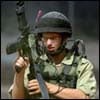I have served in the IDF for years, but I am still constantly amazed at the humanity, honor, and dedication that our forces have — qualities that have been even further emphasized in the tragic events of the past few years.
I am part of the IDF Burial Unit, a section of the Rabbinical Corps, whose mission it is to ensure that soldiers who are killed are taken care of according to Jewish law and tradition. The laws involving the treatment of the deceased are both complex and intricate. There is such a high degree of respect for the dead, including not leaving the body unattended from the moment of death until burial, removing any spilled blood from the ground, and doing everything possible to bury the body in its completeness.
This job is far from pleasant and yet is permeated with a sense of importance and holiness. It is our duty to ensure that these soldiers, who dedicated their lives to serving and protecting Israel, leave this world in the most proper of ways.
May 13th and 14th, 2004, were two of the more difficult days in our current war. On two successive days, armored vehicles filled with soldiers and laden with explosives were attacked, resulting in unimaginable explosions which sent body parts of our 11 boys as far as 400 meters away. As if this terrible loss was not enough, we then had to endure the horrid mistreatment of our beloved soldiers as Palestinians paraded their body parts through the streets. As Israel witnessed this inhumanity in disbelief, we knew that it would be our mission to retrieve whatever we could, regardless of the risk involved.

Thus begun one of the most difficult missions in all my years of service. We were ordered on Friday, early in the morning, for this holy mission to search for the remnants of two of our soldiers who were blown up in their APC (armored personnel carrier) on the Egyptian border.
We gathered together to receive instructions, weapons, and other defense systems. As is always done before a mission, we took a group picture, praying that this would not be the last time we would stand together. We climbed onto a bullet proof vehicle which brought us to the modified tanks that awaited us on the side of the road to take us to the battlefield. The commander of the 17th Golani Battalion started giving orders to the drivers as to how to create mechanisms to stop the Palestinian fire, in order to allow us to conduct our search.
Each vehicle had three members from the Burial Unit alongside seven soldiers who were to protect us as we searched. As we approached the outskirts of Rafah on the Egyptian border, we knew that this area was extremely dangerous, filled with sharpshooters who couldn't wait for us to make our appearance. As is usually the case, the first row of houses are abandoned, and used for the express purpose of hiding the terrorists who aim to destroy us.

We proceeded to our destination in a convoy, as fighter helicopters hovered above for additional protection. As soon as we entered the hostile territory, our engine heated up, pouring smoke and hot water into the vehicle. We were immediately commanded to jump outside with our weapons in firing position. The APC was all that shielded us from the fire of our enemies. It was clear that every one of us wondered if we would live to tell this story.
Within a short amount of time, another APC was called over to protect us. Meanwhile, the rest of the APCs entered the area and began their search and collection of body parts. From the moment they arrived they came under heavy fire and attack.
Once our vehicle cooled down, we received an order to go back into it and wait inside. We endured a two-hour nerve-racking wait as we sat inside the stifling vehicle. Finally we were pulled into a safe zone where we had the unfortunate task of tending to our two most recent victims. Two of our dear IDF soldiers had given their lives while trying to protect their comrades whose sole mission was to sanctify the deaths of other soldiers. The fact that these boys were killed simply trying to peacefully help retrieve body parts was almost too much to bear.
Shortly before Shabbat, the armored vehicles started returning from the fields to spend Shabbat at the army base on the outskirts of the Philadelphi Road, where one of the original attacks had taken place. Yet the retreat was not so simple and some of the APCs were stuck on the field, the last not returning until 3:00 am.

The body parts that we recovered on Friday were immediately transferred to Abu Kabir, the Israeli Forensic Medical Institute. We were informed Shabbat night that another body part was also recovered. After intense discussion with the General Staff, the IDF Chaplain, and many other additional rabbis, it was decided that we were to continue our search on Shabbat morning.
We were out in the field again first thing in the morning for additional searches and were successful. Yet our work came to an abrupt end when a missile was fired at us, the potential destruction of which was enormous. Due to a great miracle, the missile was a dud, and never exploded. At that point we were instructed to return, and we spent the rest of Shabbat with the IDF soldiers on the Rafah border. We returned home around midnight Saturday night, only to begin another week of reserve duty at 8:00 am Sunday morning.
The love of the soldiers for their comrades, in most cases people they had never met, is unprecedented. It was a privilege to serve with such fine young men. Beyond that, I can only say that this was an experience that I hope to never repeat, and certainly one that I will never forget.







Join the Discussion